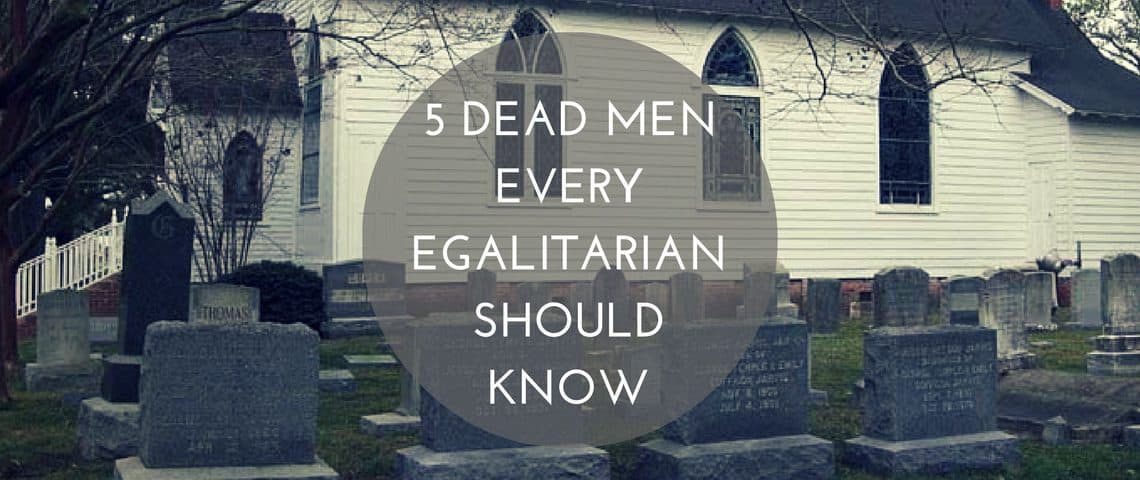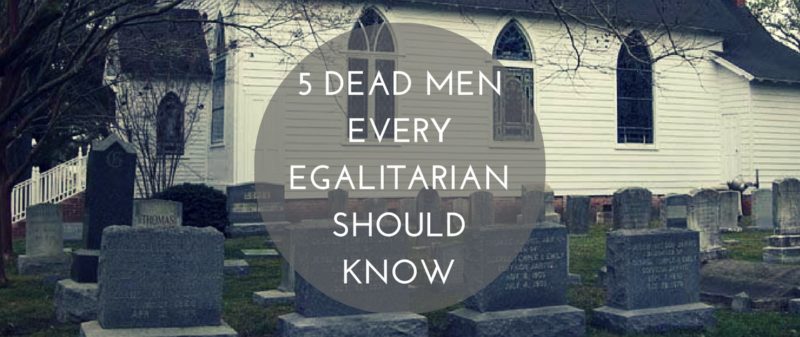“My best men are women!”
William Booth, founder of The Salvation Army
October 31st is Reformation Day, a remembrance of the day in 1517 when Martin Luther nailed his 95 Theses to a church door, igniting the Protestant Reformation.
Historian Will Durant once said, “we Americans are the best informed people on earth as to the events of the last twenty-four hours; we are not the best-informed as to the events of the last sixty centuries.” I often hear people say that those who advocate for gender equality have been influenced by the modern feminist movement, but history shows that conservatives with a high view of scripture have supported the full inclusion of women for centuries.
Here are five men who gave women increased visibility in the early years of the evangelicalism.
JOHN WESLEY 1703-1791
After a season of open-air preaching that ignited the Methodist revival, Wesley encouraged the formation of societies throughout Great Britain, North America, and Ireland that emphasized personal accountability and discipleship. Wesleyan theology is the foundation for the holiness movement, which includes denominations like the Wesleyan Church, the Free Methodist Church, the Church of the Nazarene, the Christian and Missionary Alliance, and others.
Thorsen notes that “perhaps one of the boldest practices that Wesley inaugurated was the appointment of women as lay leaders. This was unprecedented in church history and Wesley was well aware of the controversy it would bring”. He was also the “first in his circles to authorize women to teach and preach, as his initial reservations evaporated once he observed the effectiveness of their ministry” (Tucker and Liefeld).
B.T. ROBERTS 1823-1893
Roberts was originally part of the Methodist Episcopal Church. When progressives moved the denomination away from it’s emphasis on sanctification, Roberts and others left to found the Free Methodist Church in 1860. Roberts was a staunch abolitionist and a firm supporter of women in ministry, even to the point of rallying for women’s ordination.
Tucker and Leifeld note that Roberts was one of the first to advocate for egalitarian marriage, writing “The greatest domestic happiness always exists where husband and wife live together on terms of equality.” He observed that two men who have their own individual interests can be united as business partners for years without either of them being subject to the other and asked “Then, cannot a man and woman, united in conjugal love, the strongest tie that can unite two human beings having the same interests, live together in the same manner?”
A.J. GORDON 1836-1895
Gordon was an American Baptist preacher, writer, and composer (“My Jesus, I Love Thee”). In 1869, he became pastor of Clarendon Street Baptist Church in Boston, which under his leadership was described as “one of the most spiritual and aggressive in America”. A favored speaker in evangelist Dwight L. Moody’s Northfield conventions, he opened what later became Gordon Bible Institute (now Gordon College and Gordon-Conwell Theological Seminary) to train both men and women for missionary service.
Gordon opened his pulpit to women and published “The Ministry of Women” in 1894, which presented his scriptural understanding of the role of women in the church. According to Hassey, Gordon emphasized the importance of context in interpretation (biblical and cultural) and asserted that “Joel’s prophecy…was fulfilled at Pentecost and brought equal privileges to women”. He linked every great spiritual revival in church history with women’s public ministry.
FREDRIK FRANSON 1852-1908
Franson founded the Evangelical Alliance Mission and was a prominent leader of the Free Church Movement (now the Evangelical Free Church). His primary interest was missions, and during his lifetime he helped found at least six sending agencies: Danish Mission Confederation, Swiss Alliance Mission, German Alliance Mission, Finnish Alliance Mission, Swedish Evangelical Mission in Japan, and Swedish Alliance Mission.
Franson regularly used women as part of his evangelistic outreach, defending their leadership in his work, “Prophesying Daughters: A Few Words Concerning Women’s Position in Regard to Evangelism.” As Hassey notes, after studying the issue he had concluded that “Scripture overwhelmingly supports women’s public evangelization and found it remarkable that two passages (1 Tim. 2:12 and 1 Cor. 14:34) could be made to contradict the rest”.
A.B. SIMPSON 1843-1919
Simpson was a Canadian preacher and theologian who founded the Christian and Missionary Alliance (C&MA), a denomination that emphasizes global evangelism. In 1881, he started a ministry for new immigrants and the poor in New York City. Soon after, he established informal training classes in order to reach “the neglected peoples of the world with the neglected resources of the church”. By 1883, a formal program was in place with training provided in a multi-cultural and gender-inclusive context (now Nyack College).
Hassey records that Simpson “gave women a prominent place in church ministry, encouraging women’s participation and leadership in virtually every phase of early C&MA life”. Women practiced preaching in chapel along with men, and in 1887 half of all C&MA vice-presidents were women. In 1911 he wrote, “The heart of Christ is not only the heart of a man but has in it also the tenderness and gentleness of a woman. Jesus was not a man in the rigid sense of manhood as distinct from womanhood, but, as the Son of Man, the complete Head of Humanity” (excerpted from “When the Comforter Came”).
It would be a mistake to say that all of these men advocated for biblical equality in the way that we think of it now, but their endorsement of women in public ministry roles shattered cultural stereotypes of their day. They were not afraid to take a stand, in spite of opposition. To give just one example, after a series of attacks on his position A. B. Simpson responded:
“Dear brother, let the Lord manage the women. He can do it better than you, and you turn your batteries against the common enemy”.
These were men who really knew what it meant to “Act Like Men”.
Click here to read about five women who had significant influence after the Reformation (Margaret Fox, Susanna Wesley, Sojourner Truth, Phoebe Palmer, and Catherine Booth).





10 responses to “5 (Dead) Men Every Egalitarian Should Know”
Maybe a good follow-up on this post would be something about all the Irish church, who was very egalitarian before the Roman church bulldozed them.
I love that idea, Faith! I don’t know anything about it, maybe you can help with the background! I remember reading the book “How the Irish Saved Civilization”, but pretty sure that was about the Catholic church – St. Patrick and all that…
The Celtic church was very level with non-gendered leadership. The story of the showdown at Whitby, of which Hilda, Abbess of Whitby was a part, (http://forallsaints.wordpress.com/2011/11/18/hilda-abbess-of-whitby-680/) is sad because ostensibly it centred around the conflict of what date Easter would be held on, and whether or not the monks should shave the circle in their hair or not, but really, it was the Roman Catholic machine overwhelming the gentler and more spirit filled Celtic church.
The thing that is most gutting about it is that because of that more innately collaborative nature which the Celtic leaders had, they acquiesced to the Romans. Thus, the Roman system of pyramid style church with the head at the top, as opposed to the biblical system in which the apostles and prophets (and other leaders) are at the bottom as a strengthener and helper to the Church, became widespread, even in protestant denominations.
Hilda was an astonishing leader, as were so many of the other women church leaders of this day.
very healing to read things like this
That is exactly how I felt reading about these men and the women in the previous post. The egalitarian perspective has a long-standing history, even before these amazing people. Glad to it was helpful 🙂
greatly appreciated the brief history lesson — more proof that biblical egalitarianism predates modern feminism.
Thanks for this Gail. I had not previously heard of Franson, Gordon or Roberts. How encouraging it is to know that there have been clear thinking godly men supporting women for many years in recent history as well as in ancient history. Thanks for bringing them to our attention.
I’ve always loved that Booth said that some of his best men were women. Love it. Yonggi Cho is reputed to have said something very similar as he broke many social mores by releasing women in ministry in his church in Korea.
Thank you, Gail, for this historical overview of some of the important men and women all Christians should know.
You’re very welcome! I recommend putting “Daughters of the Church” on your Christmas list!
Gail! I have had that book for more than 20 years… I had it with me when I lived in Australia last and it has travelled with me since… it’s a great book.